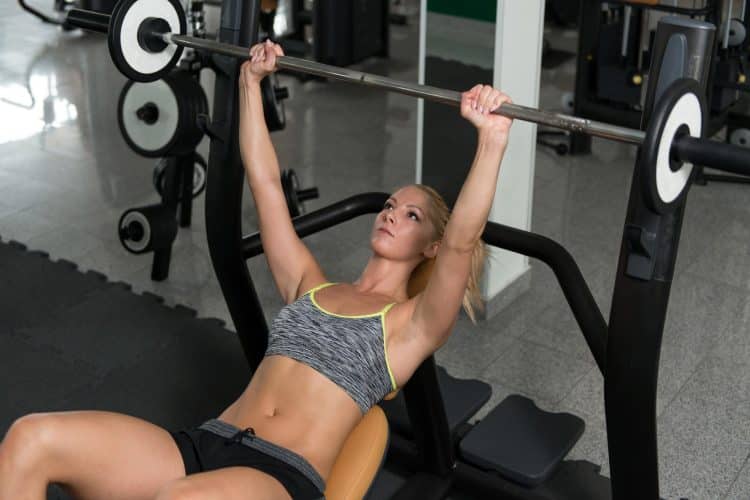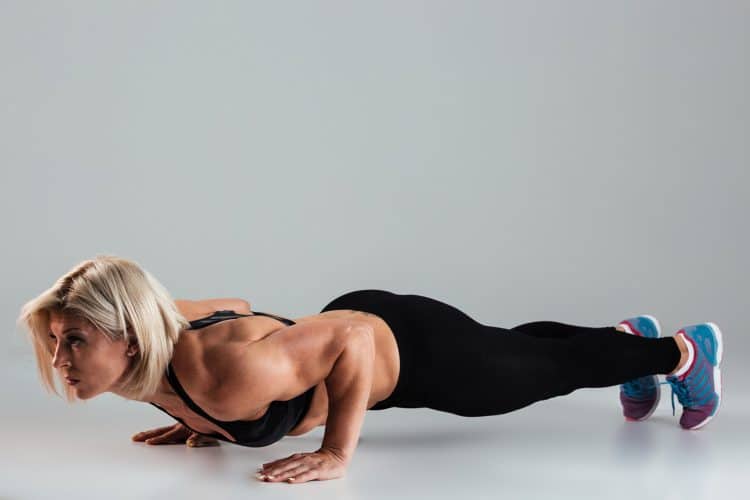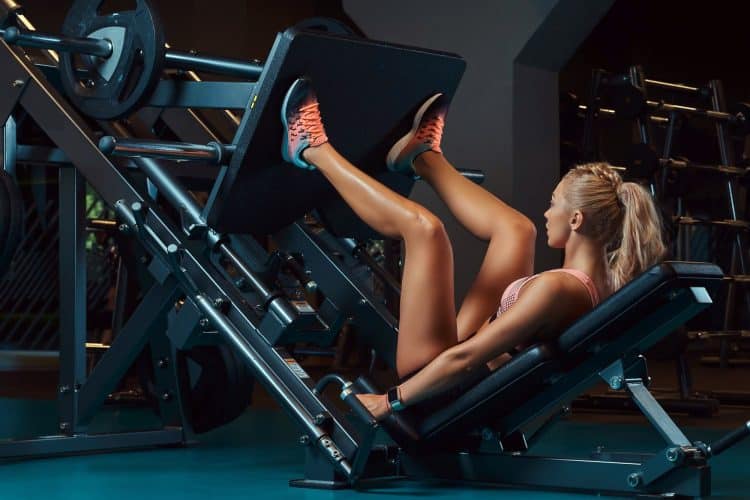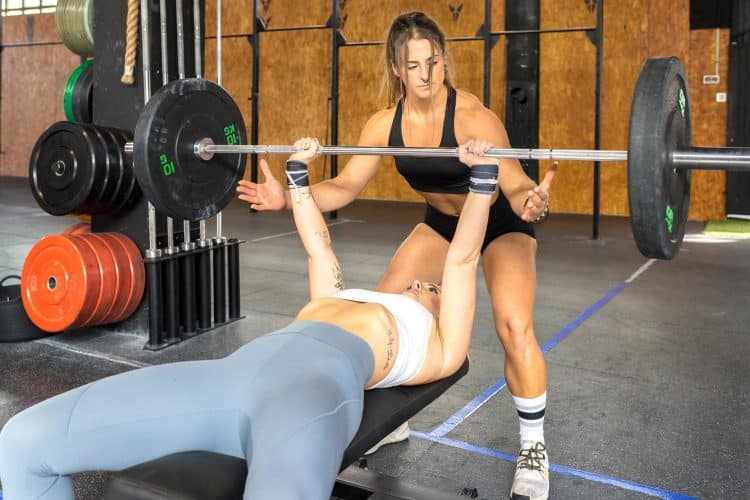Over the last decade, women have been cozying up to weight training. However, this has led us into a unique situation; the ladies look like deers caught in headlights as soon as they enter the weight room.
Although girls no longer need to be convinced to start lifting weights, only a handful of these women follow a structured workout split. Performing a few dumbbell curls one day, a couple of sets of squats the next day, and a little of everything every other day isn’t going to do you any good.
Finding the right workout split can be daunting. Furthermore, stepping inside the free-weight section of a gym for a newbie can be overwhelming, especially if they have no idea what they are doing.
A balanced training program is key to achieving your dream figure. Furthermore, the ideal workout regimen for an individual can change depending on their preferences, schedules, goals, and experience levels. Following an incompatible training split increases your risk of injury.
In this article, we dive into the meaning of workout splits, the factors and tips to consider while choosing a workout split for women, its benefits, and the five best workout splits for women at different experience levels. We have a lot to cover. So, sit tight.
What are Workout Splits?

A workout split refers to how you divide your training into different muscle groups or body parts. Many exercisers avoid picking a workout split as they find it too restrictive. Although a workout split requires you to train a specific muscle group on a particular day of the week, you are free to choose the exercises you perform in each training session.
Notably, programming a workout is best left to advanced lifters or personal trainers. Each muscle consists of different heads that must be trained from multiple angles for optimal growth. Performing similar movements can lead you to a muscle and strength plateau. For example, the deltoid muscle has three heads — anterior, lateral, and posterior. If you only perform shoulder press and front raise exercises in your training regimen, you’ll have substandard lateral and posterior deltoid head development. Does this sound like too much work? Don’t worry; we have included a sample workout plan for overall muscle and strength development with each workout split.
Many people think the ‘bro split’ is the only workout program. A bro split includes training chest on Mondays, back on Tuesdays, shoulders on Wednesdays, and so on. While there is nothing wrong with this split, most exercisers can get better results by following a more focused workout split.
For example, ladies with lagging lower bodies would want to train their legs twice a week. However, the bro split has no provisions for accommodating a second leg workout. An upper and lower body workout split will be a better fit in this case.
Benefits of Following a Structured Workout Split For Women
Here are the advantages of selecting a structured workout split for women:
Makes Your Workouts More Efficient
Many lifters treat the gym as a restaurant, and their training split as an à la carte menu. They enter the iron paradise without a plan and tackle their workout on the fly; these lifters perform the exercises that feel the most comfortable and put the least strain on their muscles. As you could have guessed, these folks see little to no progress and are most likely to drop off.
A structured workout split leaves nothing to chance. Here, you plan your workouts weeks in advance. Everything from the exercises, sets, and reps is determined before entering the gym. Having an action plan ensures you make the most of your time in the gym.
Built-in Progressive Overload
Progressive overload is indispensable if you want to make strength or muscle gains. It includes placing ever-increasing stress on your muscles by increasing the intensity and volume of your workouts. You could achieve this by doing more sets, reps, and exercises, reducing rest between sets, or incorporating advanced training principles in your workouts, such as super sets, drop sets, intra-set stretching, etc. [1]
A balanced workout split will help progressively overload your muscles and reduce your risk of hitting a plateau by shocking your muscles with varying training intensity and volume. Furthermore, an efficient workout split also allows your muscles to rest and recuperate between workouts, reducing your risk of injury.

Fix Muscle and Strength Imbalances
An effective workout split can aid in fixing muscle and strength imbalances by allowing you to work on your weaknesses multiple times a week. At the same time, it will help you polish your strengths.
Monitor Progress
You must stick to a workout split for at least 12 weeks before arriving at conclusions about its effectiveness. Since you’ll perform the same exercises, number of sets, and reps in each workout for the entire duration, it’ll make it convenient for you to track your progress.
Additionally, following a workout split and tracking your progress will help you stay accountable. Sharing your progress with your friends and family can be a potent motivator.
Keeps You Interested
Choosing a workout program is like choosing a life partner — you want someone who compliments your strengths and weaknesses.
Although the workout splits below define the exercises you’ll perform in each training session, you are free to perform their variations instead. You must, however, ensure that the replacement exercises target the same muscle groups. For example, you could do the cable side lateral raise instead of the dumbbell side lateral raise. You must, however, not replace side lateral raises with shrugs.
Knowing the exercises you’ll perform in a workout in advance can allow you time to prepare for a workout, which can improve your performance. Plus, tracking your progress will keep you hooked to your workout split.
5 Best Workout Splits For Women
Depending on your current physique and experience level, you can choose a workout split that aligns with your goals. Each workout split has its unique benefits and allows you to focus on particular muscles to fix imbalances and take you to your objectives.
Below, you’ll find five workout splits for women that involve training up to three muscle groups per training session twice a week.
Full-Body Workout Split For Women

The basic full-body workout split for women is a two-day-a-week training regimen. It is perfect for beginners and ladies with busy schedules who can only make time for a couple of weekly training sessions.
In the full-body training split, you could work all your muscle groups in a single workout or divide them into two sessions.
Since this workout split involves training most of your muscle groups in a single workout, you must follow a HIIT (high-intensity interval training) method for these workouts to get a lot of work done in a short period. Women aiming to shed weight must engage in full-body cardio exercises.
| Day 1 | Full-Body Workout |
| Day 2 | Rest |
| Day 3 | Rest |
| Day 4 | Full-Body Workout |
| Day 5 | Rest |
| Day 6 | Rest |
| Day 7 | Rest |
As you gain more experience, you could go from performing two weekly full-body training sessions to doing four weekly workouts. Perform variations of the exercises listed in the sample workout below on the two additional days to add variety to your training regimen.
Full-Body Workout 1:
Beginners must seek expert help to drill the movements. It will help you make the most of the exercises while limiting your risk of injury.
| Exercise | Sets | Reps |
| Barbell Bench Press | 3 | 8-12 |
| Barbell Bent-Over Row | 3 | 8-12 |
| Dumbbell Shoulder Press | 3 | 8-12 |
| Barbell Biceps Curl | 3 | 8-12 |
| Cable Triceps Extension | 3 | 8-12 |
| Barbell Squat | 3 | 8-12 |
| Crunch | 3 | 8-12 |
Full-Body Workout 2:
Since these workouts are programmed to induce hypertrophy, avoid resting for more than 60 seconds between sets, as it can significantly hamper your training intensity.
| Exercise | Sets | Reps |
| Dumbbell Chest Fly | 3 | 8-12 |
| Dumbbell Deadlift | 3 | 8-12 |
| Barbell Skull Crusher | 3 | 8-12 |
| Dumbbell Side Lateral Raise | 3 | 8-12 |
| Dumbbell Hammer Curl | 3 | 8-12 |
| Barbell Sumo Squat | 3 | 8-12 |
| Hanging Leg Raise | 3 | 8-12 |
Full-Body HIIT Cardio Workout
The HIIT cardio workout below includes nine exercises; perform two rounds of this circuit. You must perform each exercise for 45 seconds. Rest 15 seconds between exercises. Plus, you are allowed a two-minute rest after completing a round.
| Exercise | Time (in seconds) | Rest (in seconds) |
| Lunge | 45 | 15 |
| Push-Up | 45 | 15 |
| Burpee | 45 | 15 |
| Star Jump | 45 | 15 |
| Leg Raise | 45 | 15 |
| Squat Jump | 45 | 15 |
| Bicep Curl | 45 | 15 |
| Lateral Shuffles | 45 | 120 |
Use appropriate dumbbells for exercises like bicep curls and lunges. Feel free to use additional resistance in the squat jump. However, you must ensure you are not compromising your form to lift heavy weights.
Benefits of Full-Body Workout Splits
Here are the advantages of doing a full-body workout split for women:
- The full-body workout split is excellent for beginners as it helps them acclimatize to weight training.
- This workout regimen is great for ladies on a tight schedule, as the most basic version of the full-body split requires hitting the gym twice a week.
- Since you’ll do only one exercise per muscle group, we’ll mostly stick to compound lifts for this workout program. Besides helping you build muscle and strength, multi-joint exercises improve your overall functionality.
- Training twice weekly gives your body enough time to rest and recuperate between workouts.
Drawbacks of Full-Body Workout Splits
Here are the cons of doing a full-body workout split for women:
- As you’ll be training all your muscles in a single workout, it can be incredibly exhausting, especially as you graduate to training four days a week.
- Full-body strength training workouts can take longer to complete. Expect to spend 60-120 minutes in the gym.
- The full-body workout split is not the best for fixing strength and muscle imbalances unless you want to boost your training volume significantly.
Upper Lower Body Workout Split For Women

The upper lower body is the perfect next step for ladies wanting to move up from a two-day training regimen. It is a four-day workout split that involves training half of your body on a single day.
Notably, you should ideally start the training week by training your weaker half. Lifters with lagging lower bodies should start the week with a leg workout instead of hitting an upper body training session.
Many lifters go all-out on their stronger muscle group training day, leaving them tired and sore for their weaker muscle group workouts. Since this is a four days a week workout split, you can also rest after each workout to allow your muscles enough time to rest and recuperate between training sessions.
| Day 1 | Upper Body |
| Day 2 | Lower Body |
| Day 3 | Rest |
| Day 4 | Upper Body |
| Day 5 | Lower Body |
| Day 6 | Rest |
| Day 7 | Rest |
As this workout regimen involves training all your muscles twice a week, you shouldn’t add more training days to this training split. Instead, you could increase your training volume and intensity to get the best bang for your buck.
A study found that an upper and lower body workout split is more effective at helping you build muscle strength and size over 10 weeks than a full body workout regimen done thrice a week. [2]
Upper Body Workout:
The upper and lower body workouts primarily consist of functional (multi-joint) exercises to maximize your muscle and strength-building potential. Focus on contracting your muscles with each rep to induce hypertrophy.
| Exercise | Sets | Reps |
| Barbell Bench Press | 3 | 8-12 |
| Dumbbell Bent-Over Row | 3 | 8-12 |
| Arnold Press | 3 | 8-12 |
| Barbell Biceps Curl | 3 | 8-12 |
| Close-Grip Bench Press | 3 | 8-12 |
| Russian Twist | 3 | 8-12 |
Lower Body Workout:
You could change the order of the exercises depending on your preferences. If you have lagging calves, we recommend starting your leg workout with the standing calf raise. Use a weight that helps you achieve muscle failure between the eighth and 12th rep.
| Exercise | Sets | Reps |
| Barbell Squat | 3 | 8-12 |
| Walking Lunge | 3 | 8-12 |
| Romanian Deadlift | 3 | 8-12 |
| Goblet Squat | 3 | 8-12 |
| Leg Curl | 3 | 8-12 |
| Standing Calf Raise | 3 | 8-12 |
Benefits of Upper Lower Body Workout Splits
The pros of the upper-lower body workout split include the following:
- It allows you to train all your muscle groups twice a week.
- Training your upper and lower body muscles separately can help you fix muscle and strength imbalances, improving your overall physique proportions and symmetry.
- The upper-lower body workout split will help you build a solid foundation. You could easily pivot to a powerlifting or bodybuilding-focused workout program after following this workout split for 12 weeks.
- This workout split for women allows sufficient recovery time between workouts, which can fast-track results and reduce your risk of injury.
- Training four days a week allows you the flexibility to program your workouts according to your schedule. You could take an off day after each workout or reshuffle the training days.
Drawbacks of Upper Lower Body Workout Splits
The cons of the upper-lower body workout split include the following:
- The upper-lower body workout split is volume heavy since you’ll be training all your muscles twice weekly, which is not the best for newbie lifters.
- On the other hand, although you’ll be training all your muscles twice a week, the training volume for each muscle group can be limiting.
- Since you’ll be training half of your body in a single workout, these workouts can take a lot of time to complete. Expect to spend 60-120 minutes in the gym during your upper-lower body workouts.
Push-Pull Workout Split For Women

The push-pull workout split for women is the perfect middle ground between full-body workouts and upper-lower body workouts. Gym exercises can be broken into two main categories — push and pull.
As the name suggests, the pushing exercises involve pressing weights away from your body, for example, the bench press, overhead triceps extension, and leg extension. On the flip side, the pulling exercises include pulling the weights toward your body, such as the deadlift, biceps curl, and seated cable row.
Push-pull workouts are popular among bodybuilders and powerlifters as they help focus on a single movement pattern. This workout split can help you achieve muscle-ripping pumps and ensure you’ve got nothing left in the tank by the end of a workout.
| Day 1 | Push |
| Day 2 | Pull |
| Day 3 | Rest |
| Day 4 | Push |
| Day 5 | Pull |
| Day 6 | Rest |
| Day 7 | Rest |
Although the push-pull workout split is a four-day training program, you could increase your training volume by adding a couple of workout sessions to the split — one for each movement pattern. Also, you could increase your training volume gradually by alternating between an additional push and pull workout for the initial 4-6 weeks.
Push Workout
In the push-pull workouts, the first two exercises of the training schedule are the big lifts. The remaining four to six exercises are considered accessory lifts, which help improve your performance in the main lifts.
The ladies training for hypertrophy should stay in the 8-12 rep range and perform three sets with a moderate weight. On the other hand, lifters trying to maximize strength should do 3-5 sets of 1-5 reps with 80-90% of their one-rep max. [3]
| Exercise | Sets | Reps |
| Squat | 3 | 8-12 |
| Bench Press | 3 | 8-12 |
| Cable Triceps Extension | 3 | 8-12 |
| Dumbbell Chest Fly | 3 | 8-12 |
| Machine Shoulder Press | 3 | 8-12 |
| Seated Calf Raise | 3 | 8-12 |
Keep the main lifts, such as the squat, bench press, and deadlift, constant throughout the 12 weeks. However, you could change the accessory lifts each week to keep your workouts interesting.
Pull Workout
The deadlift is the main lift in the pull workout. All the other movements in this workout are accessory lifts. We recommend using weightlifting accessories, such as a weightlifting belt, lifting straps, wrist wraps, and knee sleeves, in these workout splits, as they help maximize your performance and reduce your risk of injury.
| Exercise | Sets | Reps |
| Deadlift | 3 | 8-12 |
| Wide-Grip Lat Pulldown | 3 | 8-12 |
| Barbell Biceps Curl | 3 | 8-12 |
| Lying Leg Curl | 3 | 8-12 |
| Dumbbell Romanian Deadlift | 3 | 8-12 |
| Dumbbell Side Lateral Raise | 3 | 8-12 |
Benefits of Push-Pull Workout Splits
Using the push-pull workout split entails the following benefits:
- The push-pull workout split for women is great for building strength and muscle mass. Change the number of reps on the three big lifts (squat, bench press, and deadlift) to 1-5 and the number of sets to five to focus on building strength.
- Training a specific movement pattern can help you achieve a better mind-muscle connection, improving hypertrophy.
- Since this workout split involves training the same muscle group at least twice, the high volume will speed up your results.
- This training split is great for powerlifters that want to improve their performance on the big three lifts.
- It allows you to further boost your training volume by doing up to two more weekly workouts.
- The push-pull workouts involve a healthy balance of compound and isolation exercises, which can help develop a balanced, proportionate, and conditioned physique.
- The four-day push-pull training split allows you ample time to recover between workouts.
Drawbacks of Push-Pull Workout Splits
Using the push-pull workout split entails the following disadvantages:
- Since this workout split involves compound and isolation exercises and requires training multiple muscle groups, the push-pull workouts can take longer to complete than the conventional workouts.
- The push-pull split is not ideal for beginners.
- This training split can be exhausting, as the push workouts include high-demanding exercises, such as the bench press, squat, and overhead shoulder press in the same workout.
Push, Pull, Legs Workout Split For Women

This training split takes the push-pull workout program up a notch. Although the push-pull routine was originally designed for powerlifters, many lifters didn’t appreciate training for the bench press and squat on the same day; hence, the push, pull, and leg workout split was born.
The push, pull, and leg split is a six-day workout program. It increases the training volume of the basic push-pull regimen by a massive 50%. This training split is best suited for advanced female lifters, as the trainers will only get one day to recover from their workouts.
Although you could do the push, pull, and leg split three days a week, you would have to increase the volume and intensity significantly, which will not only make the workouts more exhausting but would also considerably increase your risk of injury.
| Day 1 | Push |
| Day 2 | Pull |
| Day 3 | Legs |
| Day 4 | Push |
| Day 5 | Pull |
| Day 6 | Legs |
| Day 7 | Rest |
Since you have two training sessions in this workout split for each muscle group, you don’t have to do the three big lifts in each workout. Do them at the beginning of the training week and resort to accessory movements for the remaining three workout sessions.
Pay close attention to the number of sets and reps in the workouts below.
Push Workout 1
The first exercises of the first three training days of the week will be strength-focused, meaning you’ll be doing one to five reps of the exercises for three to five sets using 80-90% of your one-rep max. You must only perform these big lifts with a spotter.
| Exercise | Sets | Reps |
| Bench Press | 3-5 | 1-5 |
| Incline Dumbbell Press | 3 | 8-12 |
| Cable Crossover | 3 | 8-12 |
| Behind-the-Neck Shoulder Press | 3 | 8-12 |
| Weighted Dips | 3 | 8-12 |
| Lying Leg Raise | 3 | 8-12 |
Rest for three to five minutes for the strength-focused exercises. You must, however, limit the rest between sets to 60 seconds for the remaining lifts to ensure optimal training intensity for inducing hypertrophy.
Pull Workout 1
You are allowed a five-minute rest after the strength-focused exercise to reset and prepare for the high-rep workout. Track your workouts (sets, reps, and weights) in a journal to ensure you’re hitting your goals and are progressively overloading your muscles in each training session.
| Exercise | Sets | Reps |
| Deadlift | 3-5 | 1-5 |
| Dumbbell Curl | 3 | 8-12 |
| Lat Pulldown | 3 | 8-12 |
| Bent-Over Barbell Row | 3 | 8-12 |
| Dumbbell Side Lateral Raise | 3 | 8-12 |
| Upright Row | 3 | 8-12 |
Leg Workout 1
You could rejig the exercises in this workout if you prefer doing quad-focused accessory lifts before the hamstring-focused movements.
| Exercise | Sets | Reps |
| Squat | 3-5 | 1-5 |
| Leg Extension | 3 | 8-12 |
| Leg Curl | 3 | 8-12 |
| Romanian Deadlift | 3 | 8-12 |
| Leg Press | 3 | 8-12 |
| Leg Press Calf Raise | 3 | 8-12 |
Push Workout 2
Use advanced training principles, such as super sets, drop sets, and intra-set stretching in the second half of the push, pull, and leg training split to push up your training intensity. You must use a weight that allows you to perform each exercise with a picture-perfect form.
| Exercise | Sets | Reps |
| Dumbbell Bench Press | 3 | 8-12 |
| Decline Barbell Press | 3 | 8-12 |
| Pec Deck Fly | 3 | 8-12 |
| Arnold Press | 3 | 8-12 |
| Barbell Skull Crusher | 3 | 8-12 |
| Cable Crunch | 3 | 8-12 |
Pull Workout 2
We encourage using different hand grips on these exercises each week (supinated, pronated, and neutral) to train your muscles from different angles. It will help induce hypertrophy and keep your workouts interesting.
| Exercise | Sets | Reps |
| Dumbbell Deficit Deadlift | 3 | 8-12 |
| Cable Biceps Curl | 3 | 8-12 |
| Seated Cable Row | 3 | 8-12 |
| Inverted Row | 3 | 8-12 |
| Dumbbell Front Raise | 3 | 8-12 |
| Barbell Shrug | 3 | 8-12 |
Leg Workout 2
Feel free to swap the accessory exercises in the second workouts for the week to address any lagging muscle groups.
| Exercise | Sets | Reps |
| Box Squat | 3 | 8-12 |
| Walking Lunge | 3 | 8-12 |
| Leg Curl | 3 | 8-12 |
| Stiff-Legged Deadlift | 3 | 8-12 |
| Hip Thrust | 3 | 8-12 |
| Standing Calf Raise | 3 | 8-12 |
Benefits of Push-Pull-Legs Workout Splits
Performing the push-pull-legs training split has the following pros:
- It is one of the best workout splits for powerlifting enthusiasts. Furthermore, bodybuilders can use this 12-week program to improve their overall strength without compromising on their muscle mass.
- This six-day training split allows you to focus on each muscle group twice a week.
- A high-volume and intensity training regimen that is incredibly effective for breaking through plateaus.
- The push-pull-legs training split can accommodate many modifications to suit the lifter.
Drawbacks of Push-Pull-Legs Workout Splits
Performing the push-pull-legs training split has the following cons:
- A six-day training regimen that is best left to advanced lifters.
- Not enough recovery time, especially for lifters pushing their limits on this training regimen.
- The push-pull-legs workout split can take longer to complete than all the other training splits listed in this article.
Bro-Split Workout Split For Women

We know what you are thinking. Yes, we were kind of dissing the bro-split at the beginning of this article. However, if your goal is to build muscle mass, you cannot go wrong with this training split.
The standard bro-split is a six-day training program that includes training each muscle group once weekly. It allows you to train each muscle with ample volume and intensity to induce hypertrophy.
You could modify the workout split depending on your personal goals and preferences. For example, ladies with weaker lower bodies should begin their training week with a leg workout instead of a chest session. Restructure your workouts according to your needs.
| Day 1 | Chest |
| Day 2 | Back |
| Day 3 | Shoulders |
| Day 4 | Biceps |
| Day 5 | Triceps |
| Day 6 | Legs |
| Day 7 | Rest |
Avoid training two large muscle groups on consecutive days, such as legs and back. Have at least 48 hours between large muscle group workouts to ensure optimal rest and recovery. It also reduces your risk of injury.
Chest Workout
Many lifters leave gains on the table by following a restricted range of motion. It limits your muscle fiber engagement and leads to suboptimal gains. Use a weight that allows you to follow a full ROM.
| Exercises | Sets | Reps |
| Barbell Bench Press | 3 | 8-12 |
| Incline Dumbbell Press | 3 | 8-12 |
| Decline Dumbbell Fly | 3 | 8-12 |
| Dips | 3 | 8-12 |
| Cable Crossover | 3 | 8-12 |
| Decline Crunch | 3 | 8-12 |
Back Workout
During your back workouts, focus on driving through your elbows. Pulling the weight using your biceps can remove tension from your back and put it on your guns. Use a false (thumbless) grip where possible to limit biceps engagement. You could also experiment with using lifting straps to limit forearm stimulation.
| Exercises | Sets | Reps |
| Deadlift | 3 | 8-12 |
| Bent-Over Barbell Row | 3 | 8-12 |
| Lat Pulldown | 3 | 8-12 |
| Seated Cable Row | 3 | 8-12 |
| Hyperextension | 3 | 8-12 |
| Seated Calf Raise | 5 | 8-12 |
Shoulders Workout
You must include exercises for all three shoulder heads (anterior, lateral, and posterior) and the trapezius muscle to ensure overall growth.
| Exercises | Sets | Reps |
| Military Press | 3 | 8-12 |
| Dumbbell Side Lateral Raise | 3 | 8-12 |
| Barbell Front Raise | 3 | 8-12 |
| Bent-Over Rear Delt Fly | 3 | 8-12 |
| Barbell Shrug | 3 | 8-12 |
| Cable Crunch | 3 | 8-12 |
Biceps Workout
You’ll use pronated, supinated, and neutral grips in the biceps workout to ensure optimal biceps brachii, brachialis, and brachioradialis development. The forearm exercises at the end of the workout ensure you don’t leave any stone unturned.
| Exercises | Sets | Reps |
| Barbell Biceps Curl | 3 | 8-12 |
| Alternating Hammer Curl | 3 | 8-12 |
| Cable Reverse Curl | 3 | 8-12 |
| Machine Preacher Curl | 3 | 8-12 |
| Concentration Curl | 3 | 8-12 |
| Wrist Curl | 3 | 8-12 |
| Reverse Wrist Curl | 3 | 8-12 |
Triceps Workout
The triceps workout in the bro-split targets all three triceps heads (long, lateral, and medial) for building horseshoe triceps.
| Exercises | Sets | Reps |
| Cable Triceps Pushdown | 3 | 8-12 |
| Dumbbell Overhead Extension | 3 | 8-12 |
| Dumbbell Kickback | 3 | 8-12 |
| EZ Bar Skull Crusher | 3 | 8-12 |
| Reverse-Grip Triceps Pushdown | 3 | 8-12 |
| Cable Wood Chopper | 3 | 8-12 |
Legs Workout
Since this training session involves performing the squat and deadlift, you’ll have to go extra hard on this one. Ensure your pre-training nutrition is on point to make the most of these workouts.
| Exercises | Sets | Reps |
| Barbell Squat | 3 | 8-12 |
| Leg Extension | 3 | 8-12 |
| Leg Curl | 3 | 8-12 |
| Barbell Walking Lunge | 3 | 8-12 |
| Romanian Deadlift | 3 | 8-12 |
| Standing Calf Raise | 5 | 8-12 |
Benefits of a Bro-Split Workout Regimen
Sticking to the bro-split allows you to:
- This workout split for women allows you to focus on a single muscle group in a training session, which can help boost your strength and muscle mass gains.
- The bro-split is highly customizable and allows you to modify it according to your needs.
- Since this workout focuses on a single muscle, it requires lesser time to complete than the multiple muscle group training sessions.
- This is a versatile training split that can be used by beginners and advanced athletes alike.
Drawbacks of a Bro-Split Workout Regimen
The bro-split regimen has the following cons:
- Since you’ll be training six days a week, it gives your muscles limited time to recover.
- Folks with a busy schedule might have difficulty sticking to the six days a week training split.
Factors To Consider While Choosing a Workout Split For Women
You must consider the following factors before choosing a workout split:
Experience Levels
You must always choose a training split that is fitting for your experience level. For example, beginners should stay away from the push, pull, and leg training split and instead favor the full-body training regimen.
Further; you must adjust your training intensity and volume based on your experience. Choosing a training split based on your experience level helps streamline your progress and reduces your risk of injury in the gym.
Goals
Setting a goal before starting a training program gives you a road map. Lifters that want to build strength should opt for the push, pull, and legs training split, ladies that want to build a chiseled figure should go for the bro-split, and the women that want to hit the gym for overall fitness should stick to the full-body workouts.
Time
You should choose a training program that will fit into your lifestyle. Choosing a workout split that necessitates you to go to the gym six times a week, but you can only fit in four workouts per week is a recipe for failure. You will likely lose motivation and drop out before achieving your fitness goals.
Focus Muscle Groups
Many exercisers join a gym to improve a particular muscle group. Some ladies want a bigger booty, whereas others might want shapely arms. If you want bigger muscles, you’ll be better off choosing a training split that allows you to focus on a particular muscle group, like the bro split.
Other training splits that involve training a muscle group twice weekly, such as the push-pull regimen, can also come in handy for fixing muscle and strength imbalances.
Tips For Workout Split For Women
The following tips will help you maximize your results:
Be Open to Trial and Error
Even after you spend days reviewing the pros and cons of a workout split, the program you choose might not work for you — which is perfectly fine. Choosing the right workout split requires trial and error. Give your training split 12 weeks to work its magic. If you’re unhappy with your results, move on to something different. Ensure that you implement the learning from the previous workout split into the new one.
Nutrition and Recovery

Whether you want to build strength or carve a Greek goddess-like figure, you must back up your workout regimen with a balanced and proven nutrition and recovery program. Follow a macronutrient-focused diet to ensure you are meeting your daily protein, carbs, and fat goals. Ladies trying to gain muscle should stay in a calorie surplus, whereas those trying to shed the spare tire should be in a calorie deficit.
Plus, you must ensure you are giving your muscles enough time to rest and recuperate from your workouts. Sleep seven to eight hours each night to ensure you are properly rested for your upcoming workouts. We recommend using sports nutrition supplements to speed up your recovery process between workouts. Alternatively, you could lower your training frequency if you experience chronic muscular fatigue or soreness.
Seek Guidance
Starting a workout split can be intimidating, especially for beginners. Plus, performing the exercises with an incorrect form can increase your risk of injury. Hiring a personal trainer can help shorten your learning curve and fast-track your progress.
Stay Consistent
Consistency is key in any training program. You must stick to a suitable workout split for at least 12 weeks to achieve your desired results. Avoid skipping training sessions unless absolutely necessary.
Warm Up and Cool Down
Spend 5-10 minutes performing a mix of dynamic and static stretching exercises before each training session. It helps improves your flexibility and mobility and reduces your risk of injury. Furthermore, spend 5-10 minutes cooling down after a workout to kickstart your recovery process.
More Workout Splits:
- 6-Day Workout Split for Building Muscle Mass
- Arnold Split: The Best 6 Day Workout Split
- Best 3-Day Workout Split Routine
- Best 5-Day Workout Split Routine
- 12 Best Workout Splits
FAQs
What is the ideal workout split for women?
The ideal workout split will depend on your training goal, experience, time availability, and if you have any muscle groups that you want to focus on. With that said, beginner trainers will be better off starting with a full-body workout regimen; intermediate lifters can try the push-pull workout split, and advanced lifters should go for the push, pull, and legs regimen.
Can you alter a workout split?
You could switch the exercises in the workout splits mentioned above to better suit your training needs. However, we advise against tinkering with the foundations of a workout split. For example, you should not combine the push and pulls workouts in the push, pull, and leg routine.
Which workout split for women is best for weight loss?
Ladies trying to shed excess body fat should opt for the full-body HIIT workout listed in this article. HIIT workouts force your body to use energy from fat instead of carbs, making losing fat more efficient.
Wrapping Up
Congratulations, ladies! You are now equipped with everything you need to know to pick the most effective workout split for yourself and begin your journey to get fit and fabulous. We have also included a sample workout with each workout split, making starting your workout regimen as frictionless as possible.
Nonetheless, fine-tuning a training split to fit your needs might require some trial and error. Stay patient and consistent; work hard, and the results will follow. Best of luck!
References
- Yue FL, Karsten B, Larumbe-Zabala E, Seijo M, Naclerio F. Comparison of 2 weekly-equalized volume resistance-training routines using different frequencies on body composition and performance in trained males. Appl Physiol Nutr Metab. 2018 May;43(5):475-481. doi: 10.1139/apnm-2017-0575. Epub 2017 Dec 7. PMID: 29216446.
- Lasevicius T, Schoenfeld BJ, Grgic J, Laurentino G, Tavares LD, Tricoli V. Similar Muscular Adaptations in Resistance Training Performed Two Versus Three Days Per Week. J Hum Kinet. 2019 Aug 21;68:135-143. doi: 10.2478/hukin-2019-0062. PMID: 31531139; PMCID: PMC6724585.
- Krzysztofik M, Wilk M, Wojdała G, Gołaś A. Maximizing Muscle Hypertrophy: A Systematic Review of Advanced Resistance Training Techniques and Methods. Int J Environ Res Public Health. 2019 Dec 4;16(24):4897. doi: 10.3390/ijerph16244897. PMID: 31817252; PMCID: PMC6950543.


